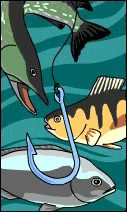An Introduction to Coarse Fishing
Created | Updated Nov 3, 2006

Since time immemorial man has sought to catch fish. To begin with this was primarily for food but, over the millennia, coarse fishing has grown into probably the most popular leisure sport in the UK.
The definition of 'coarse fishing' is the fishing for any freshwater fish, other than salmon or trout, which are considered game fish. These include roach, perch, tench, carp, bream, rudd, pike and chub, to name but a few. These fish are all returned to the water alive, and unharmed.
There are many types of coarse angler, ranging from the pleasure angler, through the match angler to the specialist anglers and specimen hunters.
Getting Started
Anyone that wants to begin fishing will need a basic kit:
- A good all round fishing rod (around 10 to 12 feet in length)
- A robust fixed-spool reel
- 100-200 metres of line (about 4-5lb breaking strain)
- A selection of hooks, sizes 18-12
- A few different types of float
- A split-shot dispenser
- A pair of rod rests
- Something comfortable to sit on
- A selection of baits
- A landing net
- A valid NRA (National rivers Authority) or Environment Agency rod licence (very important)
Local tackle shops are a good source of information, and the people that work in them are generally friendly and helpful. Don't be afraid to ask their advice.
Try not to be confused by all of the weird and wonderful gadgets and gear that are usually hanging all over the place in the shop. Stick to the list above and you will catch fish. The one thing that cannot be bought from a shop, is patience. This will be needed in abundance on occasions, but please don't be put off by this.
NRA/Environment Agency Licence
By law a National Rivers Authority or Environment Agency fishing licence is required before fishing anywhere in the UK. The revenue generated by this annual licence goes towards the upkeep of Britain's waterways, and a check on pollution. Money well spent.
Fishing Clubs and Societies
There are an abundance of fishing clubs/societies throughout the UK. Checking out your local area for clubs would be a good idea as they usually welcome new members, though some may have a waiting list. Young people just starting out will benefit from joining a club as a junior member, as the senior members are usually willing to help and offer sound advice.
Clubs that have their own waters do a lot for the local environment by keeping a check on the water quality and reporting pollution to the NRA. They also ensure that a healthy stock of fish is maintained, and manage the area immediately surrounding the water. Most clubs organise working parties throughout the year, where members can get involved with the upkeep of the waters and the surrounding environment. This has an educational benefit for the younger members, who can learn about environmental issues.
A Few General Baits
The most common bait to use is the humble maggot, hence the fisherman's nick name 'maggot drowner'. These can be purchased from any tackle shop at a very reasonable price. About half a pint is enough for a good day's fishing and will produce good results on most waters.
Worms are another favourite and can be obtained free of charge in exchange for a bit of effort, by digging in the garden or in a compost heap. These are a particularly effective bait for tench, perch, and chub.
Bread can be used either as a piece of flake just torn from the loaf and squeezed onto the hook, or mixed with a little water and kneaded into a paste. Bread paste can also be flavoured with any strong flavourings to enhance its attraction.
Sweetcorn can be used straight from the tin as-is, or can also be flavoured and/or coloured. This bait is particularly effective during the summer months.
Luncheon meat, cut into cubes and used plain or once again flavoured is a very good carp bait.
These baits will get you started catching fish. Once experience has been gained, experimenting with the more exotic and specialised baits, of which there are too many to list here, can prove great fun and very productive.
Responsibility
Some people would like to see fishing banned as a cruel sport, so every angler has a responsibility to the fish, and the environment. Use barbless hooks, treat the fish with respect and handle them with care so as not to injure them. Always return a fish carefully to the water immediately after removing the hook, so that it does not become too distressed. Do not leave any litter, discarded line, hooks, or split shot behind when you leave the water. This is not only dangerous for the local wildlife, but could be used as an argument against anglers. Remember! you are being allowed to fish on someone else's property, so don't abuse the privilege.
If this has whetted your appetite, then give it a try.

